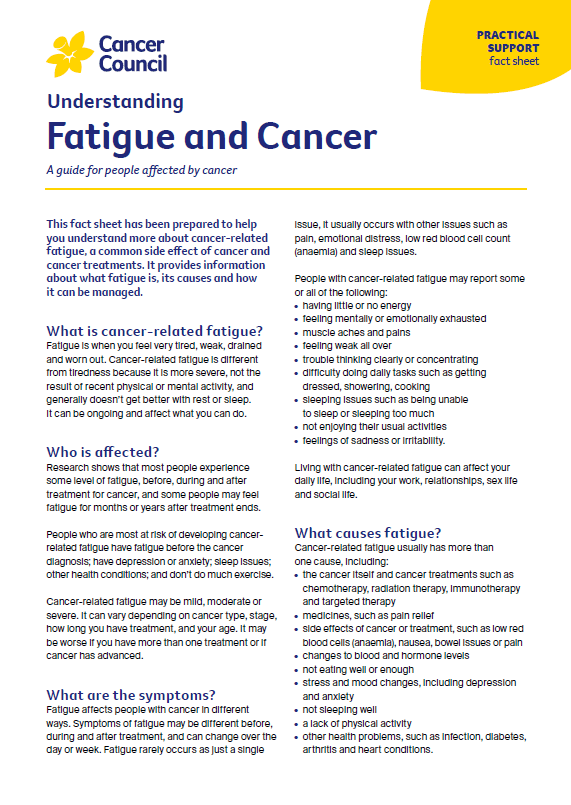- Home
- Lung cancer
- Managing symptoms
- Fatigue
Fatigue
It is common to feel very tired during or after treatment, and you may not have the energy for day-to-day activities. Cancer-related fatigue is different from tiredness, as it may not go away with rest or sleep. You may also lose interest in things that you usually enjoy doing or have trouble concentrating on one thing for very long.
Let your treatment team know if you are struggling with fatigue. Sometimes fatigue can be caused by a low red blood cell count (anaemia), or be a side effect of drug therapies or a sign of depression, all of which can be treated. There are also many hospital and other programs available to help you manage fatigue.
Managing fatigue
- Set small, manageable goals for the day, and rest before you get too tired.
- Plan breaks throughout the day when you are completely still for a while. An eye pillow can help at these times.
- Accept offers of help from family and friends.
- Ask your doctor about what sort of exercise would be suitable. An exercise physiologist or physiotherapist can help with safe and appropriate exercise plans.
- Get a referral to an occupational therapist for help with relaxation techniques, breathing exercises and ways to conserve your energy.
- Consider acupuncture – some people find it helps with cancer-related fatigue.
- Say no to things you really don’t feel like doing.
Learn more about fatigue and cancer.
→ READ MORE: Difficulty sleeping
Podcast: Managing Cancer Fatigue
Listen to more of our podcast for people affected by cancer
Dr Malinda Itchins, Thoracic Medical Oncologist, Royal North Shore Hospital and Chris O’Brien Lifehouse, NSW; Dr Cynleen Kai, Radiation Oncologist, GenesisCare, VIC; Dr Naveed Alam, Thoracic Surgeon, St Vincent’s Hospital, Epworth Richmond, and Monash Medical Centre, VIC; Helen Benny, Consumer; Dr Rachael Dodd, Senior Research Fellow, The Daffodil Centre, NSW; Kim Greco, Specialist Lung Cancer Nurse Consultant, Flinders Medical Centre, SA; Caitriona Nienaber, 13 11 20 Consultant, Cancer Council WA; Marco Salvador, Consumer; Janene Shelton, Lung Foundation Australia – Specialist Lung Cancer Nurse, Darling Downs Health, QLD; Prof Emily Stone, Respiratory Physician, Department of Thoracic Medicine and Lung Transplantation, St Vincent’s Hospital Sydney, NSW; A/Prof Marianne Weber, Stream Lead, Lung Cancer Policy and Evaluation, The Daffodil Centre, NSW.
View the Cancer Council NSW editorial policy.
View all publications or call 13 11 20 for free printed copies.
